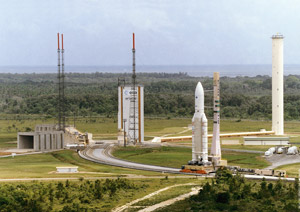Q. What is the difference in design philosophy between the Ariane 5 and H-IIA rockets?
I think it's basically the same. A country should be capable of launching its own satellites, so that other countries don't have undue influence. This is what the Ariane 5 and H-IIA rockets aim for, and I think that having a high level of reliability is the key.
Q. Do you think Japan's H-IIA rockets have the potential to succeed in the commercial launch market?
I think they do. Recently, as their reliability has been improving, the market has started showing interest. There is a chance the demand for H-IIA rockets will increase, if a system can be established where launches are coordinated according to clients' schedules.
Q. Ariane 5 had some launch troubles in the past. How did you overcome these and recover its reputation?
First of all, we focused on thorough inspection for the cause and worked on the corrective measures. I think that we were able to regain clients' trust by fully explaining our actions to them. The other thing we tried was to minimize the impact of failures on our clients, and the backup agreement is part of that.
Q. What do you think about Japan's space program?
JAXA has made great strides, and is continuing to do so. However, it seems to me that the Japanese people unfortunately don't know much about it. Possibly, not enough information has come across to the press. When there is a launch failure, the media emphasizes that result only, reporting that JAXA did a poor job, and what you hear from JAXA is just apologies. I've even read a newspaper article treating a launch delay as if it had been a failure. I question this kind of attitude because failures are sometimes unavoidable in space development. If there is a failure, I think that the media should try to deliver positive coverage towards future success. It might be effective to build a relationship with the press, like we have done in Europe, by keeping in touch on a regular basis, so their cooperation can be expected, especially when needed.
Q. How would you like the cooperative relationship between JAXA and Europe to develop in the future?
I hope there will be a backup agreement between the governments. The agreement that exists today is the one we have signed with U.S. and Japanese companies for commercial satellites. If a backup agreement is signed between the governments, the results will be very promising.
Q. Could you tell us about Arianespace's future projects? Do you have any plans for a manned rocket?

Ariane 5 moving into launch zone at the Guyana Space Center.(Courtesy of Arianespace)
Ariane 5 is scheduled to launch six satellites this year, and seven next year. It is likely to launch eight satellites two years from now. We'd like to keep growing in the global commercial satellite launch market, but we have no intention of building manned rockets. We might cooperate if such a national policy is made, but manned rockets should be discussed on a governmental level. We'll keep dedicating ourselves to launching many satellites with our Ariane 5 launcher.